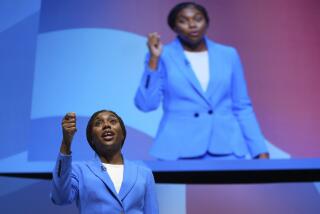British Polls Put Heseltine, Major Even : Politics: Candidates to succeed Thatcher spend day before TV cameras.
- Share via
LONDON — The three candidates for leadership of the ruling Conservative Party, a post whose occupant automatically becomes prime minister, turned to television Sunday to carry their campaigns to the people.
By day’s end, the consensus backed by opinion polls put political outsider Michael Heseltine, a former defense minister, in a neck-and-neck race with Chancellor of the Exchequer John Major, with Foreign Secretary Douglas Hurd trailing behind.
London bookmakers listed Heseltine and Major at even odds to win Tuesday’s ballot, while Hurd was considered a long-shot among the betting fraternity.
The Sunday opinion polls show Heseltine and Major beating the Labor Party if they were to lead the Conservatives in the next election.
In the past, political candidates in Britain rarely acknowledged their reliance on television to get their message across, concentrating on stumping the country and their own local constituencies, or districts.
But the crucial vote for a new leader of the Conservative Party is restricted to the 372 Tory members of the House of Commons.
They are presumed to be influenced by private appeals from the candidates and also the way in which their constituents view their performances on television.
So on Sunday, the candidates remained at home as the television cameras followed their actions and broadcasters conducted extensive interviews with all three.
By evening, the impression was that Heseltine, 57, Major, 47, and Hurd, 60, had handled themselves well against hard questioning interviewers who found no apparent chinks in their confident replies.
Hurd, in an effort to counter charges that he might be too old, was seen with his second wife and two young children on their country property.
Hurd suggested that as a man of the party’s center, he could do more to unify the Tories than Heseltine, supported from the left, or Major, who will draw right-wing votes. A vote for him, said Hurd, would avoid the “danger of a polarized result.”
Major was swamped by cameramen around his official house, which is next to the residence of the prime minister on Downing Street. But he avoided efforts of photographers to get him posed against a background of No. 10 Downing St., the official home and office of outgoing Prime Minister Margaret Thatcher, whose unexpected resignation last week touched off the current campaign.
Heseltine remained at his large country mansion, where he was interviewed inside and outside of the house.
All three claimed to be amassing more supporters for Tuesday’s vote from among Parliament’s Conservative members, although many observers speculated that none would obtain the simple majority of 187 needed to win Tuesday. This would result in a final round of voting Thursday, the mechanics of which would ensure an eventual majority for one of the three.
The views of the three contenders for Thatcher’s mantle appeared almost indistinguishable in various TV interviews Sunday.
And as veteran government ministers, used to defending and debating their positions in the House of Commons, none made the kind of slips that might have eliminated them from an American political campaign.
All three went out of their way to insist that they remain personal friends and associates and that their election battle will not endanger the new party harmony all said they sought.
All declared they favor Britain playing a stronger role in Europe, and all affirmed that they would review an unpopular “poll tax” on individuals that was a significant factor in Thatcher’s downfall.
Major stressed his experience in dealing with the economy as a successful banker and later as a senior Treasury official.
Hurd pointed to his knowledge of the world as foreign secretary and his experience in such pressure posts as Northern Ireland secretary and home secretary as evidence of his ability to govern.
Heseltine argued that his resolve and leadership qualities were demonstrated by his decision to challenge Thatcher for the post of party leader, a challenge that effectively provoked Thatcher’s resignation after she failed by two votes to win a large enough margin in a leadership contest with Heseltine last week.
Asked whether he felt he was weakened inside the party by accusations that he was the prime minister’s “assassin,” Heseltine replied: “I’ve brought about a transformation of the Conservative Party’s fortune. The mood has changed. Overnight, the division (within the party) is gone. That’s not a bad week’s work.”
Thatcher has voiced no preference among the candidates, but the London Sunday Times reported that she plans to vote for Major.
More to Read
Sign up for Essential California
The most important California stories and recommendations in your inbox every morning.
You may occasionally receive promotional content from the Los Angeles Times.













